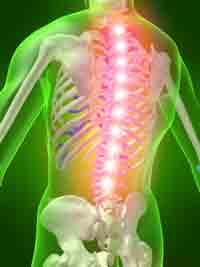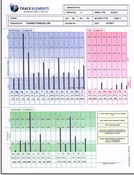Osteoporosis Natural Supplement Therapies |
| Osteoporosis - Low bone density and resulting bone fractures result in more deaths among women than ovarian and breast cancer combined, and result in more deaths among men than prostate cancer. If you have or are at risk for developing porous and brittle bones, don't despair. Bone is actually a highly complex and dynamic living tissue and remodels and regenerates 24 hours a day. Since it is alive and not dead, bone completely renews itself in ten years or less. This means that you will have a completely new skeleton every ten years – even as a mature adult. To ensure good bone health, you just have to follow the appropriate lifestyle recommendations. |
 |
Fosomax Acutally Makes Your Bones Weak and Brittle |
| So even though studies show that bone density increases when using these drugs, the bones are not made up of healthy new bone cells but of the sick and damaged old bone cells, which ultimately results in bones that are more susceptible to fractures, not less, as the years go by. |
Osteonecrosis, or “Phossy Jaw” |
Steps to Building Strong, Healthy Bones the Natural Way |
| 1. Maintain Proper Acid/Alkaline Balance - It's More Important than Calcium |
| Contrary to popular belief, loss of bone density is not so much a calcium problem as it is an acidic problem. In fact, if lack of calcium alone were the problem, Americans would have the strongest bones on the planet because we consume more dairy products than 95 percent of the world! We also take more calcium supplements than any other culture, but we head the list for fractures and brittle bones. Similarly, some studies have found an increased – not decreased – risk of fractures in people with high milk intake: In a twelve year study by the Harvard Medical School which involved over 120,000 women throughout the United States, found that women who drank two or more glasses of milk per day actually had a 45 percent higher risk of hip fractures and a 5 percent higher risk of forearm fractures than women who drank less milk. One primary cause of porous and brittle bones, which very few people realize, is excess body acidity. There are many things that can make the body too acidic – acid-producing foods, including meats and dairy products, alcohol, and not getting enough sleep. When the body becomes too acidic, it leeches the alkaline minerals from your bones, including calcium and magnesium, to rebalance itself. This is one of the major reasons that bones become porous and brittle – the calcium and other minerals that should remain in the bone structure are “stolen” by the body to help balance your body’s pH. Once the body brings pH back into balance, calcium is not returned to the bones. Instead, it is excreted in the urine, or deposited in the soft tissues as calcium deposits. So you can see how a diet that high in acidic foods can literally gnaw away at your bones over the course of a lifetime. The Calcium Myth And taking extra calcium supplements in the face of a highly acidic diet is not the answer! All the calcium supplements in the world won’t rebuild bone if it is accompanied by an acid-producing diet. A study by the University of Wisconsin found that when people on a high protein diet, such as the Atkins diet, supplemented with 1400 mgs. of calcium per day, not only did they continue leeching calcium from their bones, but they lost all of the calcium that they were ingesting in the form of supplements as well! Dr. Atkins advised people to add calcium supplements to his diet, presumably because he knew the effects of high animal protein consumption on the kidneys and on the bones. What he did not realize is that in the face of a high protein diet, calcium supplements don’t help. Another study found that even though individuals living in countries like South Africa and Singapore consume less than one-third of the recommended daily allowance of calcium, they have fewer hip fractures than their Western counterparts. This is not to say that calcium is not important – it is, and I still recommend taking a balanced and absorbable calcium supplement. But it’s not how much calcium we consume daily, it’s how much we are able to deposit into our bones that counts. And with the consumption of high animal protein diets, these calcium deposits are not being made. Clearly, addressing the acid/alkaline balance is even more important than increasing calcium intake for maintaining strong, healthy bones. How to Alkalize One way to address the important acid/alkaline balance is to eat an alkaline diet and take alkalizing supplements. Generally speaking, reducing animal protein in the diet is one of the fastest ways to maintain proper pH balance. In a study by the University of California in San Francisco, researchers found that Germany and Sweden, who had the highest consumption of fish, meat and cheese, had 40 times as many hip fractures as did Thailand! People in Thailand consume far more fruits and vegetables, two-thirds less meat, and practically no cheese than people in western cultures. When it comes to protein, it’s the type of protein that counts. Researchers have found that animal proteins are strongly acid-forming foods, whereas vegetable proteins contain alkaline compounds that neutralize any acidic effects. This is why vegetarians experience significantly less bone loss than people who consume meat. Whey protein, on the other hand, does not increase acidity. Whey is pretty much neutral and can be consumed freely. Cheese, unfortunately, is highly acidic – the more sharp and crumbly the cheese, the more acid-producing it is, with parmesan being the most acidic of all the cheeses tested. An easy way to alkalize the body is to drink alkaline water or add alkalizing supplements. |
| 2. Support the Bone Matrix and Improve Calcium Absorption |
Once you address the acid/alkaline balance, you’ll want to support the bone matrix and improve calcium absorption. Bones are made of more than just calcium, however – they also contain magnesium, phosphorous and other trace minerals as well. Vitamin K is another important vitamin that is needed to form the protein osteocalcin, a substance that attracts calcium into the bone matrix. Low levels of vitamin K are associated with bone loss and fractures. |
| 3. Exercise |
| Proper bone growth requires exercise. Exercise 20 minutes daily or half an hour three times a week. This is very important since bone grows in relation to stress (exercise). |
4. Test for Heavy Metals and Mineral Imbalances using Hair Tissue Analysis
|
We suggest getting a hair tissue mineral analysis (HTMA) to help you determine accurately what your body needs more of in terms of essential trace minerals and needs to eliminate in terms of toxic heavy metals and toxic mineral ratios.
Toxic mineral ratios and toxic metal accumulation following long term or acute exposure can contribute greatly to degenerative conditions like interstitial cystitis. |
| Essential minerals such as calcium, magnesium, zinc, iron, potassium and sodium all have important metabolic functions. However, too little or too much of any of these essential minerals can have an adverse affect on the human body and its ability to recover. |
How can a hair analysis help me achieve better health? If we consider that diet is what we consume and nutrition is what we retain, then we can see that discovering what your body needs when it needs it is a valuable tool in creating health. The dangers of exposure to toxic heavy metals such as mercury, lead and aluminum have been well documented over the years. Levels of heavy metals in the body can only be accurately measured using a hair tissue analysis or a chelation challenge test (which can be expensive and have serious side-effects). Blood or urine tests give information about your metal or mineral levels at the time of the test only. Testing for minerals in the urine measures the minerals that are being excreted from your body - not necessarily what has been absorbed as fuel for your body. So blood and urine tests are like snapshots whereas a hair analysis is the video of your mineral retention. |
A hair analysis provides a biological profile of the past 2 – 3 months of intracellular activity revealing a unique metabolic world which cannot be seen through most other tests. The hair mineral analysis gives you or your healthcare professional much-needed information about mineral deficiencies and chemical imbalances in your body, especially if you’re suffering from symptoms of any disease or disorder, including intestitial cysitis. For more detailed information on the benefits of hair mineral testing or to obtain an hair tissue analysis (HTMA), please click here. For FAQ’s about hair analysis, please click here. |
| Risk Factors for Porous and Brittle Bones |
|
| Final Thoughts… |
| It’s never too early our too late to start taking care of your bones. It appears that bone density can be increased even when women are in their 70s. The body is capable of amazing things when it receives the right materials. |
|




 FEATURE ARTICLES
FEATURE ARTICLES


